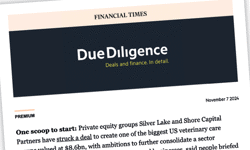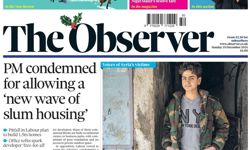A river - sometimes turned raging torrent - flows down Unhappy Media Valley UK. On its right bank lies the old Empire of Caxton, currently ruled by Mogul Murdoch, Dastardly Dacre and their marauding band of Tabloid Titans. On the left bank, you’ll find the expansive Empire of Reith, with its legions of highly-paid public servants worshipping at a temple called Fairness and Balance. And along the river, washing Leveson Isle (aka the Island of Doom) where generations of interfering politicians traditionally dwell, come great tides of change - in technology, in taste, in behaviour - that inexorably erode the banks of belief on both left and right.
Time to stop extending the metaphor perhaps, but not before noting the nature of the seemingly eternal struggle between a free but anxious press and a chained but defiant BBC. This isn’t the stuff of basic media punditry. It aspires to heroic status, and understanding, let alone solving, its conflicts, demands the skills of a seasoned diplomatic correspondent. Or at least a good working knowledge of the Game of Thrones. For in the eyes of participants scowling at each other across the turbulent stream, this is really a matter of life and death; and sometimes seemingly a battle between good and evil.
The Future of News
The ground has been fought over before, of course. The coming of television presented a clear threat - financial and journalistic - to the printed press. In the end, maybe, neither side quite won; but there was a great deal of collateral damage. And now the first BBC Future of News report, published just over a year ago, describes local journalism as “one of the biggest market failures of the last decade”, one that leaves “vast swathes of modern life increasingly unreported or under-reported”.
James Harding, the corporation’s head of news, pushes that message home pretty relentlessly. Print is declining. TV is beginning to feel the pinch of an ageing audience. “BBC News is going to have to start thinking how it is going to deliver on its mission to inform beyond broadcasting… The internet will not just mean delivering TV and radio news over a different distribution platform. It will change how people get the news, what they expect of it and what they want from the BBC.”
Look, moreover, at those who may need to fear such change. “In the UK, devolution and the decline of the regional press is creating a real need for local news coverage, a democratic deficit. What’s happening where you live and work remains your first concern in the news. The BBC has to serve local audiences; it has to provide the information they need and keep a check on those in power. In a more devolved country – in the increasingly devolved four nations of the UK - news in some parts of the country will simply not apply in others.”
It’s necessary to quote Harding because the reasons for local journalism’s alarm are all there. The internet is killing print, he says: and it’s hacking lumps out of broadcasting. But the BBC must survive come what may. Its mission is eternal - and must be fulfilled in every nook and cranny of the land that digital reaches. The left bank is on the march. War-war, not jaw-jaw.
No wonder the local press didn’t take kindly to that. No wonder, you may add, that the national press from the Mail to the Guardian finds BBC ambitions menacing. No wonder that fusillades of insults fly back and forth across Unhappy Valley. And only small wonder, perhaps, that Broadcasting House begins to grow anxious, suddenly offering a certain amount of jaw-jaw, plus the thought that a hundred or so BBC-financed extra reporters could take over some of the heavy lifting of council and court reporting from over-stretched print shorthand toilers. But the price of real peace, alas, is certain to be much higher.
As with most conflicts, there’s history that can’t be brushed aside too blithely. Fresh starts don’t come easily: nor - see James Harding’s assertions - is the corporation a natural collaborator. “In the internet age, the BBC is more necessary and valuable than ever” is a fixed refrain. Print papers can die, because outmoded. Broadcasting may wither and perish far along the road. Nevertheless, the BBC, fulfilling its sacred duty, will find new means of dominating the news. How (local papers may ask themselves) do you make love to such a zealot?
Sacred duty?
Any reasonable independent observer, arriving from a valley far away, would begin to question the certainties on both sides. They’d look attentively at a report commissioned from an outside agency by print’s top trade organisation which tended to show that the degree of present damage inflicted by the BBC was somewhat overstated - today, if not necessarily later. (Print’s hand-picked team fails to panic.) They’d look, more cynically, at a BBC Trust study finding press alarm greatly overblown. They’d naturally note the drum beats of print sympathy from Westminster specialist select committees. But they would still encounter problems sorting facts from fears and excuses.
Another raft of facts, however, is starting to make such profound uncertainty almost irrelevant. For after the Future of News Volume One comes a prospective Volume Two, prompted by the BBC’s own travails: shortfalls in the fee revenue plus the unwanted responsibility for giving viewers over 75 a free licence. Now it’s the corporation that has to start cutting back - and the boot has moved feet.
The question that James Harding and his advisors must ponder now, as they revise the future of news, is where to cut and what to save? BBC News isn’t excused doing its substantial bit this time round. Viewers and listeners who respond to Trust surveys basically want what they get now plus various extra services promised by director general Hall, which is frankly impossible. You can’t trim and trim forever. But you can, perhaps, follow where common sense clarity already leads you.
A paltry local offering
Just spend an hour or three comparing BBC radio’s website news with the sites of the local papers who fill a few inches of corporation coverage way down page. There isn’t really much comparison. The BBC standard site design gives you a good show of programme detail and a helping of local sport: but the BBC’s own news is vestigial, little more than a ritual presence. It isn’t, in all honesty, competition for the local press. So why are the newspapers so anxious about it? Part of the answer, alas, is a passed parcel of excuses in the early days before local newspapers got their act together and produced far better internet performances. But part of it - fuelled by James Harding’s previous bouts of futurology and Jeremy Hunt’s excitement about very local TV stations during his coalition time at Media and Culture - reflects real apprehension about how newspaper survival could eventually be threatened by ever-expanding radio and TV news competition.
Yet events - at least for the moment - tell you insistently that this isn’t so. What to cut? Harding could shut the £63 million a year News Channel, but it generates so much coverage for other areas that the savings slip away. But what about the £153 million a year that goes into local radio? How interwoven is that? The BBC didn’t invent local radio. It only stirred into action after the pirate radio ships and their legal offspring revealed a market for pop music that the corporation hadn’t met. Local radio news wasn’t some sacred Reithian vow: it just happened, one thing after another. And you could say the same of the way BBC online has grown - up to £174 million and so seamlessly hailed by James Harding as the corporation’s news medium of the future.
Peace hopes
There are lines in the sand here - and opportunities for peace with the press at no great price. BBC local radio sites, as I’ve already pointed out, include links to some local press stories and sites. That’s easy because local papers, for the most part, reflect the communities they serve. They belong to a societal consensus (no Sun bashing Mirror or vice-versa). Equally - another bone of contention - radio news picks up and survives on a daily diet of local press prompts and tips. So why not make this ad hoc partnership official? Not via contorted means such as Harding’s thought of 100 BBC reporters covering courts and councils for the press but, far more directly, by the BBC withdrawing from the pretence of local news coverage and leaving its sites to programme details and promotions alone. The news for and from Radio Leicester, for instance, would be found on the Leicester Mercury’s site (maybe including a BBC national feed somewhere in the mix). The radio news would basically be a Mercury responsibility, too. Essentially, local news would be a joint production, with some joint costs shared.
What, no rivalry, no distinct BBC future, no Harding vision marching through the foothills? Of course, it’s startlingly unlikely, given the BBC’s generally glum reputation as a partner from hell bent on keeping the lines of control firmly gripped in its own hands. But these are unusual times in news world, times when the cost and quality and comprehensiveness of the service matters more than snarls across Unhappy Valley. The real threat of BBC News online is higher up the chain, where the issues between the corporation and national press sites can be visceral (and even traditional BBC supporters such as the Guardian wring their hands). But at local level, there are easier ways of making peace not war - ways that help the BBC preserve other news services under sentence of imminent etiolation. The corporation has to make decisive choices. The News Channel, Radio Five Live, the World Service - or what? It is used to partnerships and co-productions in drama and light entertainment. That’s axiomatic now as costs soar. It is striking deals with ITV to share rugby, football, and other sports. The need to carry through that approach into some otherwise unsustainable areas of news couldn’t be clearer - as well as more calming to those raging river waters. A common sense life raft, anyone?












